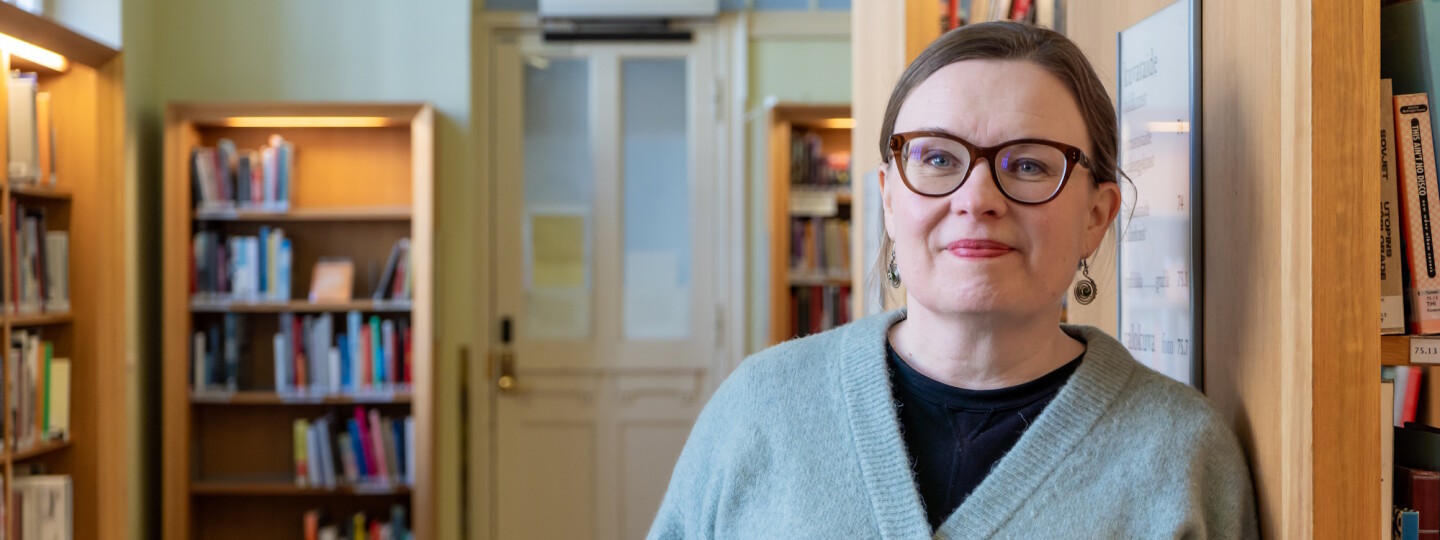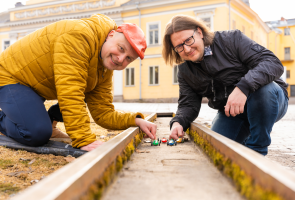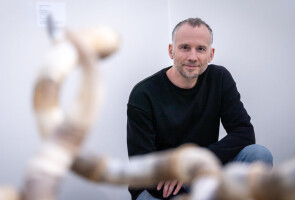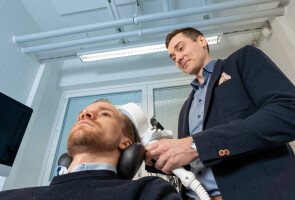Authors are the focus of University Lecturer in Cultural History, Docent Maarit Leskelä-Kärki's work. A play based on her dissertation is currently performed at the Finnish National Theatre.
A mythical look into the author Aino Kallas (1878–1956).
University Lecturer in Cultural History Maarit Leskelä-Kärki became fascinated by the topic when she was still a student. She found the published five-part series of Aino Kallas’ diaries in an antique bookshop and was completely enamoured by it.
“It is a masterpiece. She lived a very fascinating life,” Leskelä-Kärki says.
Later, Leskelä-Kärki began to ponder what was behind the great author's image. What had been left in the shadows?
Kallas's sisters Helmi and Aune Krohn were also passionate about writing and culture. Leskelä-Kärki wrote her dissertation on the three literary sisters in 2006, which inspired the play Kurjet (Cranes in Finnish) currently performed at the Finnish National Theatre.
The play is written by Tiina Puumalainen and Hanna Suutela, and directed by Puumalainen.
“It was an honour when they contacted me,” Leskelä-Kärki says.
She had wondered why there had been no greater interest in the three Krohn sisters – they could, for example, be seen as a reference to Chekhov's classic play.
Leskelä-Kärki discussed the play with the playwrights and was given drafts of the script to read. It was great to see the whole process of putting together a script based on the dissertation and the other sources.
Puumalainen and Suutela heeded writing ethics carefully to avoid copying text from the source materials into the script. For example, the letter sources could not be used in the play directly, according to Leskelä-Kärki.
Important debate on copyright
The same concern for ethics was not shown in another Finnish literary work.
Leskelä-Kärki is one of the four researchers who called out journalist Maria Pettersson for plagiarising several studies in her book Suomen historian jännät naiset (The Exciting Women of Finnish History in Finnish) (Atena, 2020).
The incident received widespread media attention. After the Copyright Council ruled that Pettersson had committed copyright infringement, she apologised.
The researchers, Leskelä-Kärki, Susanna Välimäki, Juha Torvinen and Nuppu Koivisto-Kaasik, accepted the apology. Leskelä-Kärki's own texts were not plagiarised, but a project she directed was among the plagiarised materials.
Leskelä-Kärki says that the controversy sparked a good debate on the ethics of non-fiction writing, publishing and copyright. The process was essential, albeit cumbersome.
"In the 2020s, you can no longer claim that the women of our history have been forgotten."
Leskelä-Kärki feels that now, in the 2020s, it can no longer be claimed that the women in history have been forgotten. Since the 1980s, there has been a great deal of research into women's history, and the researchers have also been actively popularising their work. Of course, there is still work to be done.
Leskelä-Kärki says the media sometimes loses sight of history.
“They create an image of researchers in ivory towers, when impact is very much considered and required in research projects in many disciples.”
In a productive in-between space
Leskelä-Kärki also holds a Title of Docent in Cultural History and Life Writing both at the University of Turku and the University of Lapland.
What's fascinating about researching past lives?
“I have always been interested in humanity and its complexities. What does a person’s life consist of, and what influences it?”
The University of Turku is the only university in Finland that offers the option to major in cultural history. Leskelä-Kärki found an academic home in a subject that combines history, cultural studies and literature.
“I have always felt myself to be in a kind of liminal space between history and literary studies, which is also a very productive place,” Leskelä-Kärki says.
Environmental humanities is a newly discovered field of research. The project she is working on, Tarinoiden lehto (The Grove of Stories in English), studies the Sagalund Museum in Kemiönsaari and develops environmental biographical research, among other things.
“Together with cultural historian Otto Latva, we have written a book on Tove Jansson and the island landscape. Her relationship with the sea has largely influenced how Finns feel about the sea,” she says.
The Uuden etsijät project (Seekers of the new in English), led by Leskelä-Kärki and funded by the Kone Foundation, discussed the cultural history of Finnish esotericism from the 1880s to the 1940s. The researchers still actively conduct their research on esotericism.
A biography of the literary figure Tyyni Tuulio is also in the works, in collaboration with journalist Leena Virtanen. Leskelä-Kärki also works on a "perpetual project" on Kallas' mother, Minna Krohn, and the relationship between her and the three daughters.
The near and dear science policy
To Leskelä-Kärki, the best thing about being a researcher is the freedom and opportunity to collaborate with different people. Her life is largely centred around her work.
Leskelä-Kärki still feels that it is important to have more to her life than the university, especially her family and children.
She works to guide early career researchers towards a healthier work culture. The pressure is high when work is often done on lump-sum funding.
“Too many things come down to money.”
Leskelä-Kärki wants to use her position to defend research and its values. She would like to see even more freedom and opportunities to take risks at the researcher–teacher level, in creating research projects and profiles, for example.
“Too many things come down to money,” she says.
Leskelä-Kärki feels it is important to avoid creating overly narrow strategies. She hopes that the value of the humanities will still be acknowledged by society in the future.
“After all, society cannot live without civilisation and culture.”
Maarit Leskelä-Kärki
Position: University Lecturer in Cultural History
Hobbies: visiting her summer cabin, spending time in nature, travelling, culture in all its forms, yoga
From: Rovaniemi and Porvoo
Text: Rosa Lampela
Photos: Hanna Oksanen, Teppo Järvinen
Translation: Alisa Helander







